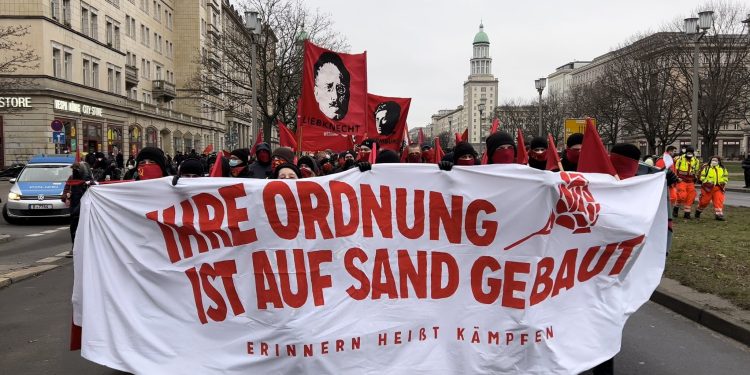BERLIN – People commemorate the 103th anniversary of murder of the communist writer, pacifist and radical inspiration. A thick carpet of red blooms smothered the grave of the early 20th-century revolutionary leader and that of her fellow leftist agitator Karl Liebknecht at the Friedrichsfelde central cemetery in eastern Berlin. Both were murdered at the age of 47 on 15 January 103 years ago. Someone had left a note in a shaky hand that read “Peace, bread, roses, freedom”.
She was considered a great orator and a prolific writer, cherished today by her leftwing supporters due to her opposition to the first world war and her fight for the rights of the working class, as well as the fact that her early death meant her reputation was not blemished by later disillusionments with the communist dream. Her name retains its popularity as a choice for her supporters’ female offspring.
Luxemburg’s slogans, along with portraits of her and Liebknecht, were held high on the red banners clutched by people as they made their way along the former Stalin Allee in eastern Berlin on Sunday, with hearty renditions of the Internationale and other revolutionary songs blaring out of portable speakers.


AN EXAMPLE FOR THE INTERNATIONALIST WOMEN’S STRUGGLE
Rosa Luxemburg was born on 5 March 1871 in the small town of Zamość in the Russian-occupied part of Poland, the daughter of a wood merchant. From 1880 to 1887 she attended high school in Warsaw, achieving excellent grades in an environment normally reserved for the daughters of Russian civil servants. She learned four languages fluently, developing her passion for the word both spoken and written at an early age, and soon enough became politically active in Polish left-wing groups.
In 1889 these activities led to the threat of her arrest, and she fled via Germany to Switzerland. At the University of Zurich—one of the few higher education institutions to which women had equal access—she first studied natural sciences, then political science and economics. She obtained her doctorate in 1897, admired and marvelled at as the only woman among the sons of landowners, factory owners, and state administrators. There she also began a passionate love affair with the Polish revolutionary Leo Jogiches.
In 1893 Rosa Luxemburg co-founded a political party: the Social Democracy of the Kingdom of Poland (SDKP), which in 1900 renamed itself the Social Democracy of the Kingdom of Poland and Lithuania (SDKPiL). In August of the same year—barely 22 years old—she made her first major public appearance in the context of the international labour movement. At the third International Socialist Workers’ Congress in Zurich, she fought to obtain a mandate for herself and her new party with a courageous speech. At that point, the mandate was denied. Rosa Luxemburg moved to Germany in 1898. A marriage of convenience enabled her to gain German citizenship. From then on she advocated for Social Democracy at party congresses in Germany, at international congresses, and through her journalistic activities. At the International Socialist Congress in 1900, she justified the necessity of international actions against imperialism, militarism, and colonial policies.
From 1904 to 1914 she represented the SDKPiL in the International Socialist Bureau (ISB). From the end of December 1905 to March 1906 she participated in the revolution in Russian-occupied Poland, where she was arrested and released on bail in June 1906. In Berlin, she worked on drawing conclusions for the German working class from the experiences of the Russian Revolution of 1905–1907, defended the political mass strike as a revolutionary means of struggle, and distinguished herself as the leader of the left-wing current in German Social Democracy.
In 1907, at the International Socialist Congress, together with Lenin and Martov, she developed an anti-war programme for the international workers’ movement. From 1907 to 1914 she worked as a teacher at the Social Democratic Party School in Berlin. She had a love affair of several years with Kostja Zetkin, the son of her close colleague Clara Zetkin.
In the spring of 1914 she was sentenced to prison for her anti-war speeches. Paul Levi was her trial lawyer, and became her new lover. In 1915, under the pseudonym “Junius”, she wrote a pamphlet—the famous Junius Pamphlet—against the brutality of the War which had been raging since 1 August 1914. At the end of 1915 she joined forces with Karl Liebknecht and other Social Democratic opponents of the war to form the “Internationale” group, from which the Spartacus group emerged in 1916.
From July 1916 to November 1918, Rosa Luxemburg was imprisoned in Berlin, Wronki, and Wrocław. In 1917 she supported the February and October revolutions in Russia with articles written from prison. She welcomed the upheavals, while at the same time warning against a Bolshevik dictatorship. On the Russian Revolution, which contained this warning, was not published until 1922, however. In this text she stated that “Without unrestricted freedom of the press and of assembly, without a free struggle of opinions, vitality withers away in each public institution—it becomes a pseudo-vitality.”
After her release from prison on 9 November 1918, she fully committed herself to the German November Revolution. Together with Karl Liebknecht, she published Die Rote Fahne (The Red Flag), campaigned for comprehensive social transformation, and was one of the founders of the Communist Party of Germany (KPD) at the turn of the years 1918–1919.
On 15 January 1919, Rosa Luxemburg and Karl Liebknecht were murdered in Berlin by officers and soldiers of the counter-revolutionary Reichswehr units.




